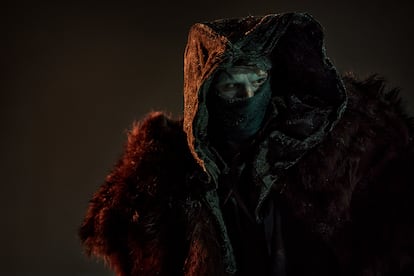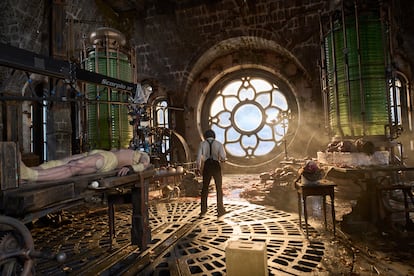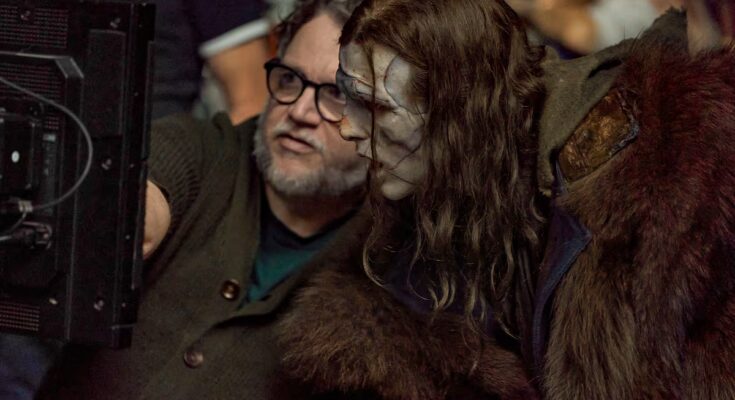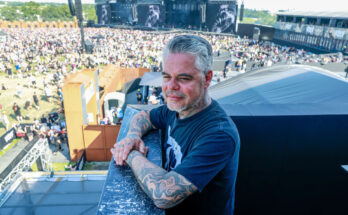Guillermo del Toro finds material for his films in his memories, his traumas and the favorite monsters he grew up with. Frankenstein — his most recent film — as he says in an interview conducted at the St. Regis Hotel in Mexico City, was the dream of an 11-year-old provincial boy. He remembers riding his bicycle to a now-defunct Maxi supermarket, buying a paperback edition of Mary Shelley’s masterpiece published by Bruguera, and saying to himself, “I’m going to make this film.”
Fifty years later, at the age of 61, the director originally from Guadalajara, passionate about his country, admits that he cannot skip Mexico by presenting a film which, like many of his projects (as he admits), “is almost not realized” and which has allowed him to “exorcise” his own history.
In a room designed for meetings with the press – surrounded by props such as a human anatomy book similar to that of Victor Frankenstein, a replica of a skull and a pen resting in an inkwell – Del Toro, always smiling and kind, cannot help but dwell on the “beauty” of a work that has marked him since childhood and which, according to him, is the story of Shelley’s life. He says his adaptation – a gothic, fantastical and modern version of the British author’s novel – seeks to fill biographical gaps that have not been directly explored but are present in his other works, such as tyrannical father figures or the idea of war that defines the Romantic movement.
“Romance comes from the recognition of death and love and how they can work together,” Del Toro said. “Romanticism is a very violent, very iconoclastic, very anarchic time, trying to destroy what was seen as a hypocritical society. People forget that Mary Shelley was 16 when she met Percy Shelley (her husband), who was 21 and married. They decided to elope against the opposition of the whole family. He brought her a poison, laudanum, which was a tincture of opium. “Drink this poison and I will shoot myself in the head. And we will live together for eternity,” he told her. For me, romance is English becoming Mexican, embracing melodrama,” he added, laughing.
The director, winner of three Academy Awards, including best director The shape of water (2018) — he still doesn’t quite understand what his is like Frankenstein the adaptation was made, given the “astronomical figures” against it and the fact that, despite this, he spent more than 20 years developing it. As with his version of Pinocchio (2022), everyone told him no, until Netflix finally gave his creativity the green light. The streaming giant organized a premiere for Del Toro last Monday worthy of the grandeur of his latest film. The Antiguo Colegio de San Ildefonso – an architectural landmark dating back to 1583 in the historic center of Mexico City – has been transformed into a decorative and symbolic stage for another type of stories the director loves to tell: stories of childhood, children and horror.
“For me, the biography of humanity is that of broken families,” Del Toro said. “So, all great movements – as Shakespearean tragedy or historical analysis shows so well – arise from a lack of affection in early childhood. Whether it is the Napoleonic wars or political corruption, these are the result of missing figures who would have completed the self in childhood. You have seen Blade II (another of his films)? It’s the story of a vampire son who returns to ask his father, “Why did you make me like this?” AND Frankenstein it is, fundamentally, the story of another child created by a wounded child to heal his own childhood, and it reproduces its brutality. It’s not that the work is a metaphor; our lives are the metaphor. It’s incredibly curious when you say, ‘I won’t repeat what I saw my father do wrong,’ and then at 41 you say, ‘Oh, when did I become my father?'”
The parallels between Del Toro’s feelings, the work and his characters are undeniable. The director of Pan’s Labyrinth (2006) also took the liberty of portraying a moment from the novel that had never before been shown on film: the creation of the creature itself. Adaptations of Frankenstein they have always shown us the monster and the lightning that animates it, but never the prelude that precedes that moment. The Guadalajara-born director did not want to describe it as an episode of terror, but rather as one of “joy”. For this reason, he decided to film the sequence as a musical, imagining Oscar Isaac (as Victor Frankenstein) as the conductor who sets the score: a waltz begins to play and the creature’s body begins to take shape.
“Imagine that moment, you have a guy who’s wanted to create something for 20 or 30 years. That’s the moment he’s most excited,” Del Toro explained. “He’s happy. And it has to be a moment of excess of anatomy, of blood, of tendons and muscles. From there comes the hangover that, for all of us born in Mexico, asks us: what do we do with the leftovers? The questions that someone from the developed world doesn’t ask, we ask ourselves. Víctor throws away the leftovers. That’s how he sees humanity. He doesn’t care. He cares about his idea. It’s a brutality that you only question. when you grew up in a country where that language is common.

“Because I’m Mexican”
As usual, Del Toro was greeted like a rock star when he arrived at the Colegio de San Ildefonso with his main actors. He chatted with people along the red carpet, took photos and signed memorabilia, pictures and posters that fans had brought before the screening of his film. The excitement was such that, after introducing the film, he joked that he would take his actors – Oscar Isaac and Jacob Elordi (who plays the creature) – to “get drunk” while the film was shown, and that they would return afterwards for a brief conversation with Netflix co-CEO Ted Sarandos, who was also in attendance.
Two and a half hours later, with some tequila and pulque inside – as Del Toro admitted – the three went back to talking about the film. Although Sarandos’ questions were asked in English, both Isaac, who is of Guatemalan descent, and del Toro insisted on keeping the conversation in Spanish. The exception was Elordi, who drew applause from fans during his brief speech in English – and in his attempt to say “Many thanks” to the fans in attendance.
The Mexican director is a staunch defender of old-school cinema, always committed to minimizing computer-generated images and supporting art “made by humans for humans”. Sarandos asked him why he puts so much effort into the details and almost artisanal craftsmanship that characterizes each of his projects. Amid the rising tide of artificial intelligence in the film industry, Del Toro – encouraged and in good spirits – gave an answer that has become something of a trademark and drew applause from the audience.
“Because I’m Mexican,” he said. “The way we see art in Mexico is with two hands and two balls. We don’t have digital assets, dammit, but we have the craftsmanship, the artistry, the vision, the color, the texture. I’m not going to shoot like a first-world director, even if I’m in the first world. The ingenuity, the way of making something look bigger, prettier, more magnificent, that’s all Mexican instinct.”

After del Toro’s “horrible” experience with Harvey and Bob Weinstein – who stripped him of creative control over his first Hollywood film, imitate (1997), and tried to sink his career before it reached its stratospheric height: he vowed never to lose creative control of his projects again. This is also why he knows how to choose his battles, which also applies to the limited theatrical release of Frankenstein because of Netflix’s business model.
“I fight for the size of the screen. I care that this film exists in theaters, but what I fight for most is the size of ideas. That is what is vital. What is vital is that the size of ideas is never tamed and that we always aim to make great cinema, cinema that transports you and cinema that shows you the work of hundreds of people who care that you are sitting there,” he said.
Sign up to our weekly newsletter to get more English-language news coverage from EL PAÍS USA Edition



